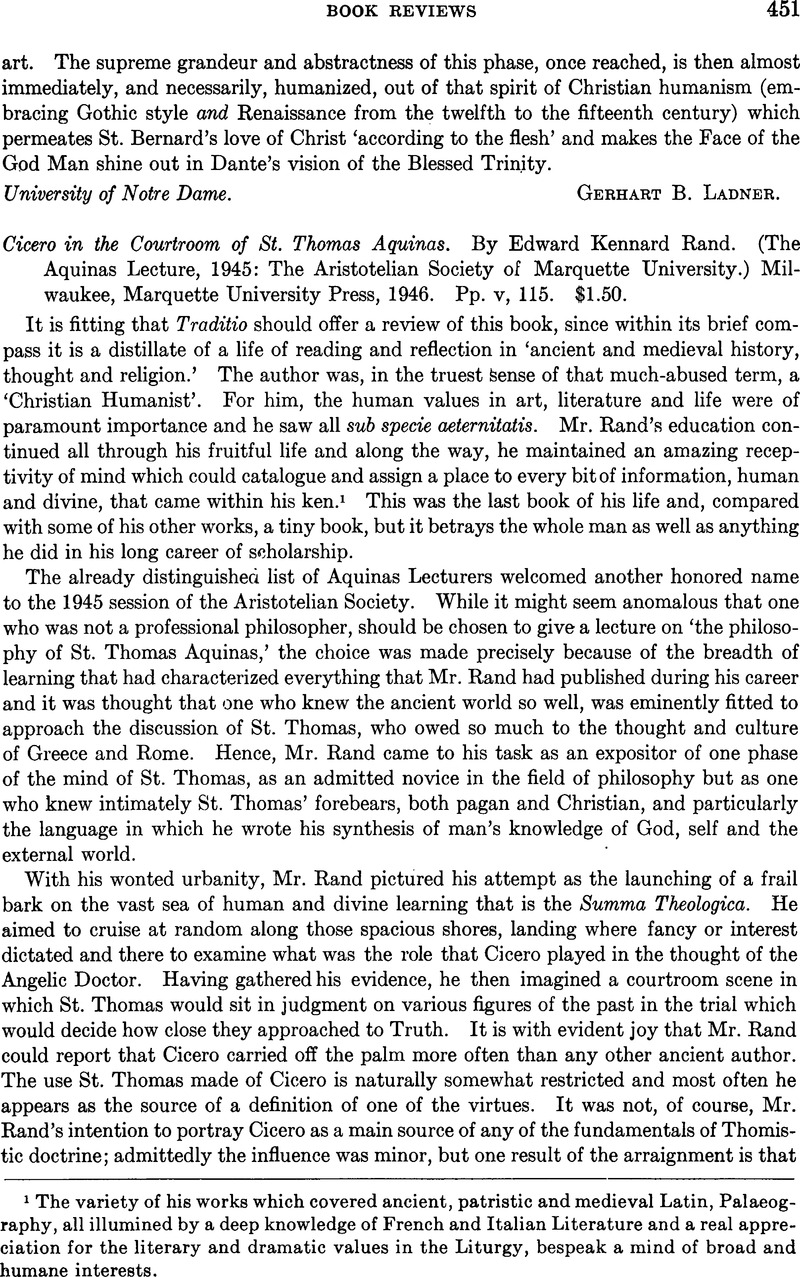No CrossRef data available.
Article contents
Cicero in the Courtroom of St. Thomas Aquinas. By Edward Kennard Rand. (The Aquinas Lecture, 1945: The Aristotelian Society of Marquette University.) Milwaukee, Marquette University Press, 1946. Pp. v, 115. $1.50.
Published online by Cambridge University Press: 17 July 2017
Abstract

- Type
- Book Reviews
- Information
- Copyright
- Copyright © 1946 by Cosmopolitan Science & Art Service Co., Inc.
References
1 The variety of his works which covered ancient, patristic and medieval Latin, Palaeography, all illumined by a deep knowledge of French and Italian Literature and a real appreciation for the literary and dramatic values in the Liturgy, bespeak a mind of broad and humane interests.Google Scholar
2 Appendix I, 103–112 summarizes the information taken from Cicero. Appendix II briefly outlines the contributions of Seneca and Boethius. It had been his intention to examine all three in this lecture but the material on Cicero was so rich and suggestive that the larger plan was abandoned.Google Scholar
3 A very restrained and reasonable discussion of this matter is to be found in Thurot, C., ‘Extraits de divers manuscrits latins pour servir à l'histoire des doctrines grammaticales au moyen âge,’ Notices et extraits des manuscrits de la bibliothèque impériale et d'autres bibliothèques 22, 2 (1868) 500–501. In part he says: ‘On peut distinguer quatre éléments dans sa composition: les mots destinés à désigner des choses inconnues à l'antiquité, l'usage de la Vulgate, la terminologie scolastique, l'usage des écrivains du xiie siècle qui ont fait autorité pour les ages suivants. … De tout temps, les choses nouvelles ont rendu nécessaire et légitime l'emploi des termes nouveaux pour les désigner, et s'interdire les mots ce serait s'interdire de nommer les choses ou se condamner à la paraphrase, à l'impropriété, à l'équivoque. Quant au latin de la Bible, comme on le croyait inspiré directement de l'Esprit saint, il était naturel qu'on le préférât au latin classique. La terminologie scholastique se justifie comme toutes les terminologies scientifiques. Des idées nouvelles sont comme les choses nouvelles et réclament des mots nouveaux. …’ Google Scholar
4 St. Aug. De doctrina Christiana II 60 (Florilegium Patristicum 24, Ed. Vogels, H. J., Bonn 1930) 46; cf. Traditio 3 (1945) 223–225.Google Scholar
5 Rand, E. K., ‘The Classics in the Thirteenth Century,’ Speculum 4 (1929) 244–269.Google Scholar
6 p. 71 note 2.Google Scholar
7 p. 65.Google Scholar




